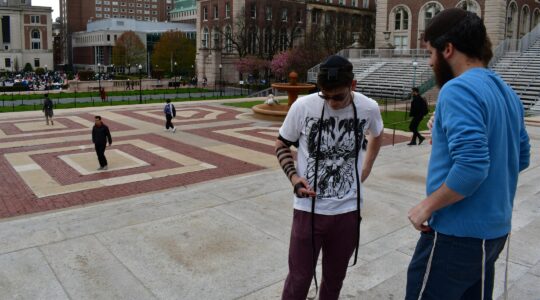OBITUARY
PHILADELPHIA (JEWISH EXPONENT) — Franklin Hamlin Littell, an influential Holocaust educator who died May 23 at the age of 91, was known for bringing a different point of view to the topic.
Littell began working in Holocaust education in the late 1950s, and broke new ground by approaching the discipline from a Christian theological perspective.
"As a Christian minister, he was involved from the beginning in acknowledging the importance of this genocide to an interfaith world, and that this was not just a Jewish issue," said Josey Fisher, director of the Holocaust Oral History Archive at Gratz College in Melrose Park, Pa.
Burt Siegel, former director of Philadelphia’s Jewish Community Relations Council, said Littell’s message was not only the history of the Holocaust, but also "that Christian churches hadn’t been good Christians, and that wasn’t always a comfortable message."
Littell was known for "not letting people off the hook easily,” Siegel said, “and that had a lot to do with his success."
Fisher said Littell’s focus on examining the theological and the scholarly impact of the Holocaust had a profound effect on the interfaith world.
"There was never a time when he saw it as somebody else’s history," she said, pointing out that one of Littell’s chief accomplishments was helping to establish the Scholars’ Conference on the Holocaust and the Churches, which will hold its 39th annual meeting this fall at St. Joseph’s University in Philadelphia.
Littell, who earned his doctorate at Yale University, began his work in earnest in 1959 when he offered a graduate seminar at Emory University on "The German Church Struggle and the Holocaust," said to be the first course of its kind.
A number of teaching posts followed before he joined Temple University, where he remained until he retired in 1986.
Littell also spent 25 years as a visiting professor at the Institute of Contemporary Jewry at Hebrew University in Jerusalem. He marched for civil rights with the Rev. Martin Luther King Jr. and Rabbi Abraham Joshua Heschel, and in 1978 became a founding member of the United States Holocaust Memorial Council. He also was the first Christian appointed to the international governing board of Yad Vashem.
His 1975 book “The Crucifixion of the Jews” was called the first Christian response to the Holocaust.
Littell began Temple’s Holocaust-studies doctoral program in 1976, served as president of the Philadelphia Center on the Holocaust, Genocide and Human Rights, and was emeritus distinguished professor of Holocaust and genocide studies at the Richard Stockton College of New Jersey.
For 25 years he wrote the nationally syndicated Holocaust column "Lest We Forget."
Rabbi Rebecca Alpert, a Temple professor for whom Littell was a dissertation adviser, credited him with shaping much of what the world knows today as Holocaust studies — from grade school through college.
Alpert said Littell also insisted that "to profess means to stand for something — it doesn’t mean simply to teach."
"We Jews always feel like we’re standing alone, and we make quite a bit about the fact that nobody cares and paid attention, and this was a man who cared and paid attention,” she said. “This was a man who wanted to keep the conversation going between Christians and Jews."





